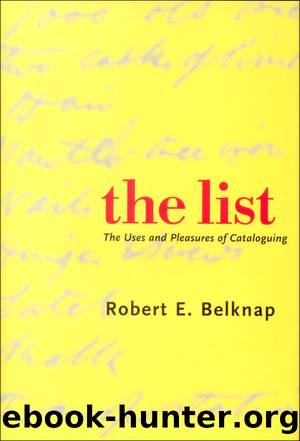The List by Belknap Robert E

Author:Belknap, Robert E. [Belknap, Robert E.]
Language: eng
Format: epub
ISBN: 9780300103830
Publisher: YaleUP
Published: 2005-09-15T05:00:00+00:00
Hebrew.
Greek.
CETUS,
Latin.
WHÃL,
Anglo-Saxon.
HVAL,
Danish.
WAL,
Dutch.
HWAL,
Swedish.
HVALUR,
Icelandic.
WHALE,
English.
BALEINE,
French.
BALLENA,
Spanish.
PEKEE-NUEE-NUEE,
Fegee.
PEHEE-NUEE-NUEE,
Erromangoan [MD II]
The investigation here is not made more plain; it is rather made more complicated by additional possibilities, particularly when the fiercely independent terms from the Tropics burst onto the linguistic scene with the declarative force of a whaleâs arching breach. These last entries are etymologically isolated but nevertheless claim their positions among the languages of the ancient and modern worlds, the first languages of literature, and the languages of nautical exploration and world dominion. By their enigmatic presentations, these tabulations force the reader to speculate upon their significance. Ultimately, both âEtymologiesâ and âExtractsâ gesture toward the novelâs complexity, and indicate the historical, philological, and imaginative continua through which and across which it will selectively operate.
Coincident with its unrestrained pleasure in verbal play, the narrative of Moby-Dick shifts through many literary forms and styles, with abrupt changes that seem to interrupt what might be considered the plot of a traditional sea narrative. Melville was not the first to assemble a compendium of forms and styles in a single work. Renaissance theorists considered Homerâs foundational encyclopedic epics the source of all literary forms, as well as of all arts and sciences. Milton, in devising his own seventeenth-century comprehensive epic, interwove a multiplicity of literary forms with such extraordinary precision that, to paraphrase Barbara Lewalski, the movement from âless to more noble genres (or varieties within a particular genre)â within Paradise Lost could be seen to correspond to the movement in moral understanding that occurs within it.10
In Moby-Dick, digressions and intrusions take a variety of forms, including short stories, dramatic monologues, satire, zoological or legal treatises, encyclopedias, and manuals. As Ishmael assimilates the descriptive and expressive means of literary and subliterary genresâsermons, ghost stories, travelogues, tall tales, epics, lyric poetry, and dramaâhe enfolds his narrative in an ever more complex system of languages. It is further complicated by the narratorâs personal advance through a series of stages (neophyte, armchair naturalist, yarner) and by the rendering of the various characters with speaking parts. Queequeg, Bildad, the Cook, Star-buck, Ahab, and Pip each has his own phraseologies, with unique vocabularies and grammatical peculiarities. The novel even incorporates what we consider nonliterary forms and makes them important contributors. âWhaling Voyage of One Ishmaelâ reads as an interlude on a Barnumesque playbill, situated between an election and a battle;11 lost sailors are memorialized on the wall of the Whalemenâs Chapel, their markers indicating their fates with a reductive single sentence; a nongrammatical list of goods fleshes out the practical but arcane management of a whaling fleet.
Although Moby-Dick bombards the reader with information, it is continually undermining the validity of that information. A major theme seems to be that what can be acquired from books is one remove distant from what can be experienced, which is at another remove from what actually is. Though Ishmael propounds at length, citing all manner of evidence regarding the whale, he is frequently evasive. He states, for example, that âthe sperm whale, scientific or poetic, lives not complete in any
Download
This site does not store any files on its server. We only index and link to content provided by other sites. Please contact the content providers to delete copyright contents if any and email us, we'll remove relevant links or contents immediately.
Cecilia; Or, Memoirs of an Heiress — Volume 1 by Fanny Burney(32538)
Cecilia; Or, Memoirs of an Heiress — Volume 2 by Fanny Burney(31935)
Cecilia; Or, Memoirs of an Heiress — Volume 3 by Fanny Burney(31925)
The Great Music City by Andrea Baker(31911)
We're Going to Need More Wine by Gabrielle Union(19032)
All the Missing Girls by Megan Miranda(15925)
Pimp by Iceberg Slim(14476)
Bombshells: Glamour Girls of a Lifetime by Sullivan Steve(14046)
For the Love of Europe by Rick Steves(13868)
Talking to Strangers by Malcolm Gladwell(13341)
Norse Mythology by Gaiman Neil(13332)
Fifty Shades Freed by E L James(13228)
Mindhunter: Inside the FBI's Elite Serial Crime Unit by John E. Douglas & Mark Olshaker(9313)
Crazy Rich Asians by Kevin Kwan(9271)
The Lost Art of Listening by Michael P. Nichols(7487)
Enlightenment Now: The Case for Reason, Science, Humanism, and Progress by Steven Pinker(7303)
The Four Agreements by Don Miguel Ruiz(6739)
Bad Blood by John Carreyrou(6609)
Weapons of Math Destruction by Cathy O'Neil(6260)
